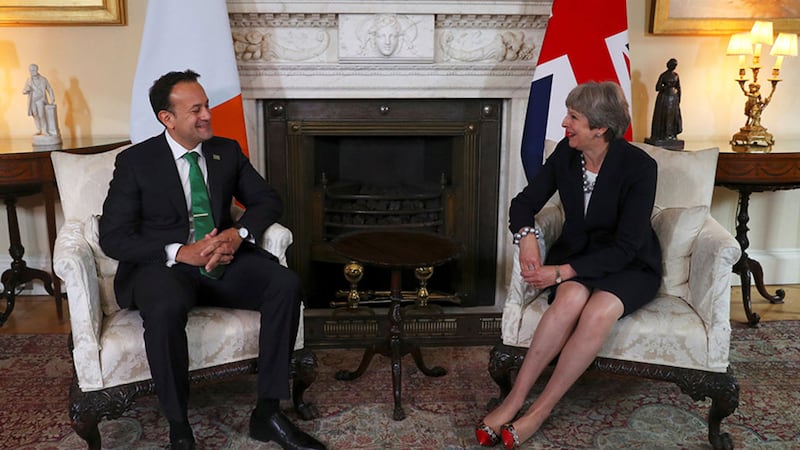On Monday the Taoiseach met Theresa May in Downing Street to talk about Brexit and the north.
For Brexit read the border, the Irish government’s main source of concern because of its disastrous consequences for trade and commerce. Varadkar was asking for some specifics. Well, you can only wish him luck there for the British government doesn’t have any specifics.
Michel Barnier was looking for specifics too on Monday and yesterday but again of course there are none so negotiations won’t proceed to the next stage before December and that means January 2018. May assured Varadkar that she wanted, guess what, no return to the borders of the past. Isn’t it disgraceful after fifteen months that she’s still mouthing meaningless robotic sentences?
There is a reason of course, the civil war in the Conservative Party which broke out again within 48 hours of her Florence speech. Hostilities will be renewed at the Conservative Party conference next week, the main reason why May can’t be specific. All she can talk about is what she doesn’t want, no borders, not a trade deal like Canada’s, not like Norway’s but like what? No idea.
The British government’s civil war means they can’t propose a solution about the Irish border because they don’t know what sort of trade arrangements they want between the UK and EU. The EU’s position is the diametric opposite. Britain has to come up with a political proposal for the border before the EU will talk about trade.
Here we come to the crux of the matter. The British government must work that out with the Irish government because obviously any political solution must necessarily involve Dublin, something this British government has been reluctant to do for the past seven years as they sashayed ever closer to the DUP. That’s a reason one of the key elements of the Good Friday Agreement has been allowed to atrophy. The other reason is equal lack of interest by the Irish government of Enda Kenny and the useless ministers he appointed with responsibility for the north.
That key element is the British-Irish Intergovernmental Council (BIIC), not to be confused with the British-Irish council. The BIIC is an integral part of a new British-Irish Agreement in 1998 which replaced the 1985 Anglo-Irish Agreement. Indeed it’s been allowed to fall into such disuse that it’s questionable if our proconsul’s advisers even know of its existence let alone its powers. Its purpose officially is ‘to bring together the British and Irish governments to promote bilateral cooperation at all levels on all matters of mutual interest within the competence of both governments.’
This points up the hypocrisy of unionist politicians who reared up in faux outrage when Simon Coveney said there couldn’t be just British only direct rule. What he was getting at is that if devolved government comes to an end the BIIC comes into regular operation and can also discuss reserved and excepted matters. To emphasise the hypocrisy of unionist politicians, in case you don’t know something they know perfectly well, there’s a permanent standing secretariat of the BIIC based in Belfast just like the old Maryfield. There are civil servants from the NIO and Department of Foreign Affairs servicing the BIIC and furthermore unionist politicians, though not from the DUP, have regularly attended functions in the secretariat.
Mind you, that doesn’t mean DUP politicians haven’t regularly met Irish officials from the secretariat on an informal basis. So let’s dispense with this lie that Dublin has no involvement in the north, nor can have. If devolved government goes they will be involved as of right.
Unfortunately the Irish government hasn’t pressed for regular meetings of the BIIC. The last meeting was in Dundalk in February 2007 despite the Good Friday Agreement stating ‘there will be regular and frequent meetings’. The BIIC is the ready-made forum where the two governments should be discussing European and international relations and where the Irish government is entitled to put forward ‘views and proposals’ and where the two governments are required to make ‘determined efforts to resolve disagreements’.
Such an official forum is certainly preferable to an exchange of pleasantries in Downing Street and a photo opportunity outside the door of Number 10.









